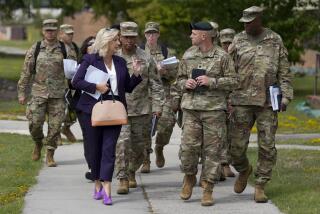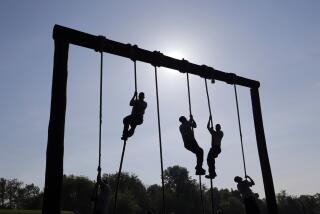Operation Baby Boom Hits Pendleton : Births: First babies fathered by Marines and sailors after returning from Gulf War are due next month. Officials report a 17% increase in military family pregnancies.
CAMP PENDLETON — Almost nine months after the end of Operation Desert Storm, some of the 30,000 Marines and sailors who went to war from Camp Pendleton are making up for lost time and starting an apparent baby boom.
The first war babies are due in December. Early signs indicate there is a 17% increase in military family pregnancies over the preceding two years, and that rate is expected to climb.
“Everybody’s gut feeling is we’ve got a baby boom,” said Navy Capt. William Rowley, commanding officer of the Naval Hospital at Camp Pendleton.
Two people who don’t need convincing are Lance Cpl. Michael Labit, 21, and wife Elizabeth, 19, who “met” and fell in love through an exchange of letters while the amphibious assault vehicle crewman spent three months at war.
Marriage and children weren’t in the San Diego native’s plans, but when he came home on April 8, he discovered the experience of war had changed his mind.
“I didn’t expect to get married at all, but you tend to realize how important things are,” Labit said.
He and Elizabeth married in July, moved into a one-bedroom apartment in downtown Oceanside, and learned last month they will be parents in June.
How many other Camp Pendleton couples face similar decisions is not known because statistics about any possible baby glut are still sketchy.
But military medical officials, relying on anecdotal information and some preliminary numbers, have concluded that there is a clear trend toward higher-than-normal birth numbers.
Navy hospital lab results from September and October show 162 women had positive pregnancy tests, a 17.4% increase over the same two-month period in 1990 and a slightly greater jump over those two months in 1989.
“I think that’s significant,” said Cmdr. Ismael Lopez, an obstetrician-gynecologist at the base hospital.
Lopez believes the jump in pregnancies has been constant since most Marines and sailors returned to base in March and April, but he cautioned it might take a year before actual births reveal whether this is a full-fledged baby boom.
However, medical officials presume the baby boost may be even higher than 17% because civilian hospitals in North County are also handling some overflow military pregnancy cases.
Tri-City Medical Center in Oceanside reports a sharp increase in the number of cases referred by the base under the Civilian Health and Medical Program for the Uniformed Services (CHAMPUS), which provides off-base medical service for military dependents.
But while Camp Pendleton awaits its new arrivals, there are mixed reports about the post-war military birth rate at other installations.
Pat Kelly, spokeswoman for the U.S. Naval Hospital, San Diego, said the facility is detecting no signs of a heightened birth rate. “Our monthly figures generally remain constant,” she said.
Similarly, Camp Lejeune, a huge Marine base in North Carolina, isn’t seeing any fluctuation. “As far as a substantial increase from the norm, no, there isn’t one,” said a base spokeswoman, Staff Sgt. Sylvia Gethicker.
Much of the discussion in military circles about post-war babies began at the Army’s Ft. Bragg, N.C., where a spokesman, Sgt. First Class Skip Richey, recounted that “certainly there’s a lot more babies than we normally have.”
However, Richey doesn’t regard it as a baby boom, but just the predictable rise in pregnancies that always follows the return of troops from overseas duty. “We don’t consider it extraordinary after a deployment,” he said.
More to Read
Sign up for Essential California
The most important California stories and recommendations in your inbox every morning.
You may occasionally receive promotional content from the Los Angeles Times.










